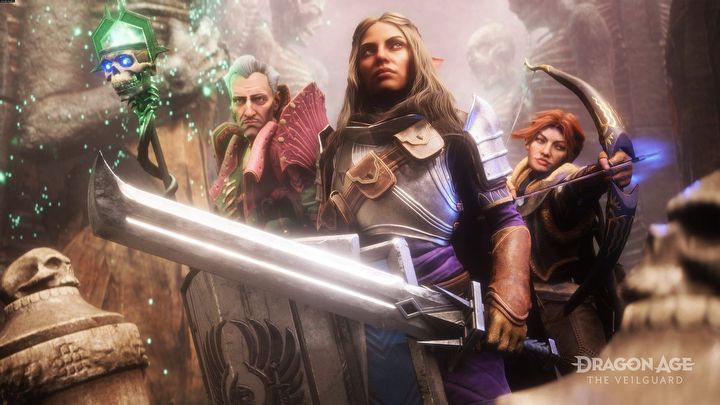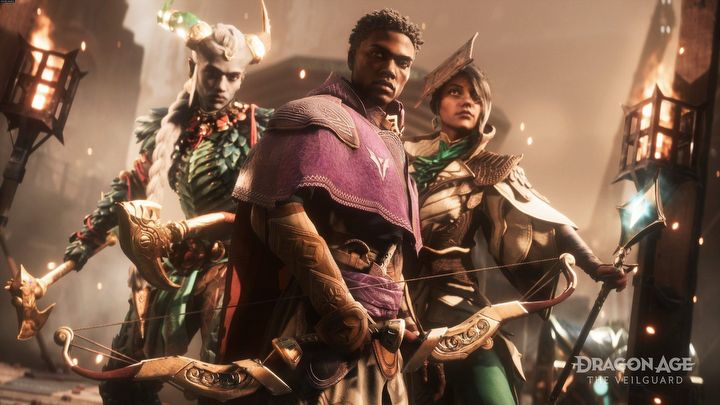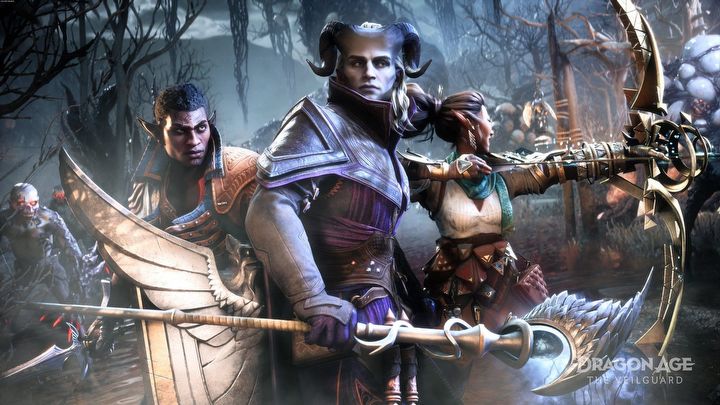Dragon Age Veilguard: Classes
When creating a character in Dragon Age Veilguard, you can choose between a warrior, a rogue and a mage. Each archetype has its own specializations, which you will read more about on this page of the guide.
Choosing one of the three classes in Dragon Age Veilguard will determine your gameplay style. To help you make your choice, we have prepared the following list, where we have collected some of the most important information about the Warrior, Rogue and Mage classes. We've delved into all of the specializations so that it's easier for you to steer your character's development.
- Warrior
- Champion (Warrior)
- Reaper (Warrior)
- Slayer (Warrior)
- Rogue
- Duelist (Rogue)
- Veil Ranger (Rogue)
- Saboteur (Rogue)
- Mage
- Death Caller (Mage)
- Evoker (Mage)
- Spellblade (Mage)
Warrior
The Warrior class is a classic archetype focused on direct, close-range combat. Warriors can wield two sets of weapons and they can switch between them. The combination consists of a one-handed weapon plus shield and a two-handed weapon. Representatives of this class can also throw their shields, which gives them access to several ranged attacks.
Many of the Warrior's abilities revolve around dealing massive damage in a specific area (Whirlwind, Fury of the Forge) and knocking enemies off balance (Titan Stomp). This, combined with the high durability of this class, makes warriors ideal for the role of tanks that attract enemies' attention.
Champion (Warrior)
The Champion specialization focuses on fighting with a sword and shield. Many of their traits and skills focus on increasing the hero's defensive abilities or are based on perfect parrying. Here are some examples:
- Reverb - creates a fiery shockwave upon successful parry;
- Shield Bearer - increases shield damage by 10%;
- Inspiring Guard - allows you to parry unblockable enemy attacks.
The Champion's offensive abilities focus mainly on fire, exemplified by the Warden's Fire special ability, which deals massive fire damage over a wide area. Unlocking the appropriate passive abilities (Ring of Fire, Enflamed) will allow you to additionally increase the damage dealt with this element.
Reaper (Warrior)
The Reaper's skills rely primarily on necrotic damage. Abilities like the Reaper or the Spirit Storm also apply the Siphon effect, which restores the user's health when they damage enemies.
It is also worth paying attention to the skills specific to this specialization, which are based on shield throws (Perfect Throw and Death's Throw), as well as the passive abilities that accompany them. They affect the type and amount of damage dealt, shield bounce between enemies and bonus effects applied upon landing hits.
The Reaper specialization will appeal to gamers who prefer a dynamic combat based on combining attacks using different types of weapons. Additionally, the ability to drain enemy health can make necrotic warriors good mobile tank material.
Slayer (Warrior)
The last of the Warrior specializations focuses on two-handed weapons, attacks that break enemies' defense lines and high mobility. Many of your abilities (For Gold and Glory, Heroic Leap) will knock enemies off balance, giving you a chance to counterattack.
Passive abilities, unlike the previous two Warrior specializations, are not focused on any specific element. They do, however, influence the performance of charged attacks and the power of basic physical attacks.
The Slayer subclass will appeal to gamers who prefer a decisive, offensive approach to combat. The wide range of empowered attacks and high mobility of the specialization will allow a Slayer to easily become the party's main DPS.
Rogue
Rogues rely on precise, calculated attacks that deal high damage. During combat they mainly use two blades wielded simultaneously and a crossbow. It is worth noting that crossbows have a finite number of arrows, but they automatically renew over time.
One of the most important features of a Rogue is high mobility and the ability to seamlessly chain attacks with both types of weapons. Many of the special abilities allow you to make quick counterattacks (Riposte), guarantee critical damage (Downfall), or provide wide area damage (Lightning Flask, Hurricane of Blades).
The Rogue will be a great choice for players who prefer fast, mobile characters with a wide arsenal of offensive abilities. If you are also interested in a classic archer archetype, this class will be the right choice.
Duelist (Rogue)
The Duelist subclass focuses on melee combat using dual blades. Many of the skills available to it increase the bonuses resulting from the accumulation of adrenaline charges (Mounting Thrill, Shall We Dance). Additionally, active abilities can also throw your enemy off balance.
The Duelist also specializes in necrotic damage, which should be taken into account when choosing this specialization.
Veil Ranger (Rogue)
Veil Ranger is a specialization focused on ranged attacks. Abilities are primarily based around enhancing crossbow attacks and applying additional effects to them. Here are some examples:
- Archer's Rhythm - increases damage from a fully charged shot by 50%;
- Sniper's Triumph - hitting an enemy in the head with a charged attack causes the next attack to send multiple arrows towards the target.
If you prefer ranged combat, the Veil Ranger specialization will be a perfect choice for you.
Saboteur (Rogue)
A highly unique subclass whose combat strategy revolves around the use of explosives and advanced mechanics. The special ability, Fortune's Fury, even allows you to temporarily use a special mortar that shoots fire projectiles.
The Fortune's Turret allows you to attack enemies remotely and helps you maintain control of the battlefield.
A wide selection of close- and long-range abilities makes the Saboteur a well-balanced specialization. It will therefore appeal to players who prioritize flexibility on the battlefield.
Mage
This archetype's strength is its wide range of different spells. They make the Mage an extremely flexible class that can easily fit into the role of either a powerful DPS or a defensive support character.
Mages excel at maintaining control of the battlefield with a set of skills that control crowds and empower teammates.
Death Caller (Mage)
This specialization involves necromancy. Abilities like Spirit Bomb or The Crypt's Herald work at medium range and allow you to drain life energy from enemies, which also heals the attacker.
Passive abilities focus mainly on boosting necrotic abilities (Death's Blessing) and bonus ranged attack effects (Soulburn, Invigorating Beam). Skills that empower attacks are also worth looking into; these, however, come with an additional cost. Here are some examples:
- Overdraw - skills cost 50 mana more, but gain 50% bonus armor penetration;
- Death Surge - allows you to double the damage of ranged attacks with twice the mana consumption.
Evoker (Mage)
Evokers are mages who specialize in ice magic. Their spells allow them to control the battlefield.
The Evoker's offensive skills have a wide range of action and bonus effects such as freezing or pulling nearby enemies (Entropic Sphere, Vortex of Shadow). Passive abilities increase frost damage (Ice Storm) or provide additional buffs to basic ranged attacks (Two Fires, Quickened Strikes).
This specialization will appeal to players looking for classic gameplay based on ranged attacks and crowd control.
Spellblade (Mage)
The Spellblade subclass turns the mage into a frontline offensive DPS. It uses a dagger and spells, and many of its skills deal additional electrical damage (Thunderous End, Void Blade).
This specialization can be an interesting alternative to the agile rogue focused on close-range combat. Its advantages include greater flexibility and a wide arsenal of spells that allow you to adapt your strategy to the situation.
You are not permitted to copy any image, text or info from this page. This site is not associated with and/or endorsed by the developers and the publishers. All logos and images are copyrighted by their respective owners.
Copyright © 2000 - 2026 Webedia Polska SA for gamepressure.com, unofficial game guides, walkthroughs, secrets, game tips, maps & strategies for top games.



